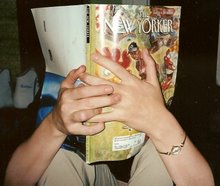Book review: "Happiness Sold Separately"
“Happiness Sold Separately.” By Lolly Winston. Warner Books. $21.99. 296 pages.
A few days after finishing this, I’m still not sure what I think. You know when you think you know what you’re getting into when you start reading a book and then it turns out by the end that it’s completely not what you expected and it makes you really angry? That’s what happened with this book. I finished it all in a rush, eager for the payoff that I was sure would await — but then it never came. While that probably makes the book a better novel, it still made me mad.
Lolly Winston published “Good Grief” a few years ago, and it became a best seller. Like the works of Jennifer Wiener (“In Her Shoes”) or Marian Keyes (“Rachel Takes a Holiday”) or Anna Maxted (“Getting Over It”), “Good Grief” was upscale, emotionally therapeutic chick-lit. It was perfect book club material — a young wife has to deal with the unexpected death of her husband, something that just isn’t supposed to happen when you’ve just gotten married and think you have the rest of your life all settled. The book made you cry (well, it made me cry anyway), but it was also funny, as Winston’s narrator was able to laugh at how ridiculous she was being in her grief. By the end of the novel, she has moved on — which is exactly why this book became a best seller.
As anyone who has dealt with grief knows, it doesn’t usually end so neatly. You take one step forward, two steps back, five steps forward, one and a half steps back. But it’s always a part of you, somewhere, even when no one else is paying attention and you have “moved on.” Yet for some strange reason, even after you’ve dealt with losing someone, it’s nice to read stories where other people’s grief has a tidy ending. Thus, I expected “Happiness Sold Separately” to have a happy ending too, or at least some version of it. And I guess, in a weird way, it does. But I’m getting ahead of myself.
“Happiness Sold Separately” is the story of Elinor and Ted Mackey. A workaholic lawyer, Elinor put off having a family until, as she discovers when pushing 40, it is too late. Their grief over miscarriages and painful and ultimately worthless fertility treatments has placed an unbearable strain on their marriage, only five years old, and Ted begins an affair with a younger nutritionist at the local gym. Elinor discovers the betrayal at the beginning of the novel, and things fall apart.
Like Winston’s prior novel, this book focuses on grief — grieving the loss of the children one will never have, grieving the loss of the marriage one took for granted. Unlike the previous novel, the grief is never resolved. Nothing is resolved, in fact, when the novel ends. Is it a happy thing that the failing marriage is probably over? Well, I suppose it will make the characters happier. But that’s not the happy ending that I wanted. If the character were going to break up, couldn’t they have found true love elsewhere, however unrealistic?
That’s the problem with this book. It tries to be a realistic novel, an Ann Beattie-type of book where a marriage is falling apart and no one is happy and everyone is deeply flawed yet somehow redeemable. The lack of any kind of resolution is what actually happens in real life, after all. But Winston never manages to cross over into Beattie’s world. Her characters need a happy ending. And in this book, they don’t get one, leaving them, and us, hanging.

No comments:
Post a Comment